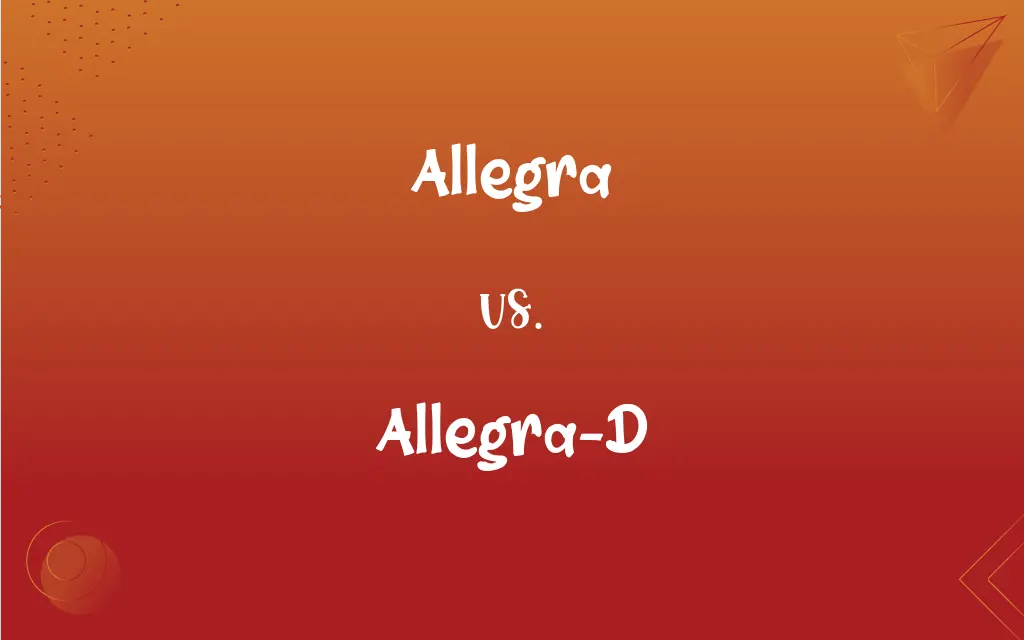Allegra vs. Allegra-D: What's the Difference?
Edited by Aimie Carlson || By Harlon Moss || Published on February 22, 2024
Allegra is an antihistamine for allergy relief, while Allegra-D combines this antihistamine with a decongestant for additional relief from nasal congestion.

Key Differences
Allegra, known generically as fexofenadine, is an antihistamine used to treat allergy symptoms such as sneezing, itching, and runny nose. Allegra-D, on the other hand, includes the same antihistamine benefits of Allegra but adds pseudoephedrine, a decongestant, to relieve nasal congestion.
Allegra primarily targets histamine reactions in the body, reducing allergic symptoms without causing drowsiness. Allegra-D not only addresses these allergic responses but also works to reduce swelling in nasal passages, offering relief from sinus pressure and congestion.
The non-drowsy formula of Allegra makes it suitable for daytime use, allowing individuals to manage allergies without sedation. Allegra-D, due to the presence of pseudoephedrine, can sometimes cause mild stimulation, making it less ideal for nighttime use for some individuals.
Allegra is often recommended for those who need relief from typical allergy symptoms, while Allegra-D is better suited for those who also suffer from nasal and sinus congestion as a part of their allergic reactions.
Allegra can be purchased over the counter without restrictions, whereas Allegra-D, due to its pseudoephedrine content, is often kept behind the pharmacy counter in many regions, requiring a customer to ask for it specifically due to regulations controlling pseudoephedrine sales.
ADVERTISEMENT
Comparison Chart
Composition
Contains fexofenadine (antihistamine)
Contains fexofenadine and pseudoephedrine (decongestant)
Primary Use
Relieves allergy symptoms
Relieves allergy symptoms and nasal congestion
Sedative Effect
Non-drowsy formula
May cause mild stimulation due to decongestant
Ideal for
Typical allergy symptoms
Allergy symptoms with nasal and sinus congestion
Purchase Regulations
Over the counter without restrictions
Often behind the counter due to pseudoephedrine
ADVERTISEMENT
Allegra and Allegra-D Definitions
Allegra
Used to alleviate symptoms like sneezing, itching, and watery eyes.
Allegra quickly relieved her sneezing and itchy eyes during the spring season.
Allegra-D
May cause mild stimulation, making it less suitable for evening use.
He avoided taking Allegra-D at night as it could interfere with his sleep.
Allegra
An over-the-counter medication for seasonal and year-round allergies.
She bought Allegra at the pharmacy for her year-round dust allergies.
Allegra-D
Often kept behind the pharmacy counter due to its pseudoephedrine content.
He requested Allegra-D from the pharmacy counter for his severe nasal blockage.
Allegra
Suitable for long-term management of allergic reactions.
Her doctor recommended Allegra for ongoing management of her pet allergies.
Allegra-D
A combination of antihistamine and decongestant for allergy and congestion relief.
Allegra-D helped him manage both his hay fever symptoms and sinus congestion.
Allegra
An antihistamine medication for treating allergy symptoms.
After taking Allegra, her seasonal allergies improved significantly.
Allegra-D
Includes pseudoephedrine for additional relief of nasal congestion.
She found Allegra-D effective for her stuffy nose during allergy season.
Allegra
A non-drowsy formula ideal for daytime allergy relief.
He preferred Allegra because it didn't make him sleepy during work.
Allegra-D
Ideal for those who need relief from both allergies and sinus pressure.
For her spring allergies accompanied by sinus pressure, Allegra-D was her go-to medication.
FAQs
Why is Allegra-D regulated differently than Allegra?
Allegra-D contains pseudoephedrine, which is regulated due to its potential misuse in making illicit drugs.
What is Allegra used for?
Allegra is used for relieving symptoms of allergies, such as sneezing, itching, and watery eyes.
Can Allegra cause drowsiness?
Allegra is generally non-drowsy and suitable for daytime use.
Is Allegra suitable for children?
Yes, Allegra is available in formulations suitable for children, but it’s important to follow age-specific dosage recommendations.
What additional benefit does Allegra-D provide?
Allegra-D provides the additional benefit of relieving nasal congestion due to its decongestant component.
Can I take Allegra-D for a cold?
While Allegra-D can relieve nasal congestion, it's primarily designed for allergies, not cold symptoms.
How often should Allegra-D be taken?
The dosage of Allegra-D depends on the specific formulation; always follow the recommended dosage on the package or as advised by a healthcare provider.
Are there any common side effects of Allegra?
Common side effects of Allegra can include headache, drowsiness, and nausea, but they are generally mild.
Is there a difference in strength between Allegra and Allegra-D?
Both contain the same strength of fexofenadine, but Allegra-D has the added decongestant pseudoephedrine.
Can Allegra cause any allergic reactions?
While rare, allergic reactions to Allegra can occur. Symptoms of an allergic reaction should prompt immediate medical attention.
How quickly does Allegra work?
Allegra typically starts working within an hour of ingestion, providing allergy relief.
Can Allegra-D be used at night?
Allegra-D can cause mild stimulation due to pseudoephedrine, so it may be less suitable for night use for some people.
Is a prescription needed for Allegra-D?
In many places, Allegra-D is available without a prescription but must be requested from the pharmacy counter.
Can I take Allegra for long-term allergy management?
Yes, Allegra can be used for long-term management of allergies, as directed by a healthcare provider.
Can Allegra be taken with other medications?
It's important to consult a healthcare provider before combining Allegra with other medications.
Does Allegra-D increase blood pressure?
The decongestant in Allegra-D, pseudoephedrine, can raise blood pressure in some individuals.
How is Allegra-D different from other decongestants?
Allegra-D combines an antihistamine with pseudoephedrine, specifically targeting allergy-related congestion.
Is Allegra effective for pet allergies?
Yes, Allegra can be effective in relieving symptoms of pet allergies.
Can pregnant women take Allegra or Allegra-D?
Pregnant women should consult their healthcare provider before taking Allegra or Allegra-D.
Is it safe to drive after taking Allegra-D?
While Allegra-D is generally non-sedating, individual responses can vary, so it's advisable to know how it affects you before driving.
About Author
Written by
Harlon MossHarlon is a seasoned quality moderator and accomplished content writer for Difference Wiki. An alumnus of the prestigious University of California, he earned his degree in Computer Science. Leveraging his academic background, Harlon brings a meticulous and informed perspective to his work, ensuring content accuracy and excellence.
Edited by
Aimie CarlsonAimie Carlson, holding a master's degree in English literature, is a fervent English language enthusiast. She lends her writing talents to Difference Wiki, a prominent website that specializes in comparisons, offering readers insightful analyses that both captivate and inform.































































